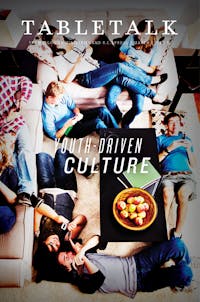
Request your free, three-month trial to Tabletalk magazine. You’ll receive the print issue monthly and gain immediate digital access to decades of archives. This trial is risk-free. No credit card required.
Try Tabletalk NowAlready receive Tabletalk magazine every month?
Verify your email address to gain unlimited access.
He was asking a question that I had heard multiple times during my years as a pastor: “Do you have children’s church?” This time, instead of giving an extensive explanation for our practice of not segregating our church worship gatherings by ages, I decided to give a brief and accurate yet intentionally provocative answer. Here’s how it went:
“Yes, we do. Every Sunday.”
“Great. Can you describe how it is structured?”
“Sure. We have singing, prayer, Scripture reading, giving, and teaching. We also observe the Lord’s Supper monthly, and periodically we observe baptism.”
“That sounds interesting. Are adults allowed to attend?”
“Absolutely! In fact, we encourage adults to attend these worship services with their children.”
My conscience wouldn’t let me leave this young father with a false impression, so I went on to explain that while we do have worship for children, we do not have a separate worship service exclusively for them. Rather, our worship, like our church, is designed for all ages.
Granted, a church that is committed to ministering to people of all ages faces a daunting challenge. In our day of specialization, it is much easier to “target” ministry to those who share a stage of life than to minister to people whose ages are spread over several decades.
Perhaps that is why some have actually tried to structure churches to do just that, resulting in youth churches, student churches, and senior-citizen churches. What is even more common is the intentional balkanization of churches into self-contained, age-segregated ministries that at best coexist within a local congregation. In this model of ministry, it is possible that the only place where grandparents, parents, and children see each other at church gatherings is in the parking lot.
The Bible recognizes that believers occupy a wide range of life stages and that there are particular needs worth emphasizing for particular age groups. We should note the ways the Bible specifically instructs these groups. Adults, both married (Eph. 5:22–33; 1 Peter 3:1–7) and single (1 Cor. 7:25–38; 1 Tim. 5:3-8), youth and young adults (Eccl. 12:1; 2 Tim. 2:22), and children (Eph. 6:1; Col. 3:20) are addressed with respect to their ages.
A church that is given to an expositional ministry cannot ignore these and other age-sensitive passages in Scripture. The real challenge arises at the point of application. How can a church effectively minister to the needs of all its members who span a wide range of ages?
While I would never pretend that there is only one set way—or even one best way—to answer that question, there are certain biblical principles that must be observed as a church considers how to structure its energies for ministering to all ages.
First, as already stated, the fact that the Bible recognizes and addresses believers at different stages of life should be considered as a church plans its ministries. Everything from sermon application to service opportunities should reflect this awareness. As a pastor, I know it is easy to inadvertently build my sermon applications around my own life circumstances. If the apostles occasionally gave instruction to specific age groups in the churches they served, so should I.
Second, a church must guard against establishing specific age-sensitive ministries that unintentionally undermine the church as a family. Where ministry becomes so targeted that the children never worship, pray, serve, or study with the youth, who never do these things with the adults, who in turn never do them with the children, whatever good may be accomplished comes at the expense of undermining the very nature of the church itself. The consequences are spiritually devastating because opportunities to defer to the preferences of others and sacrifice for their wellbeing are avoided while a consumer mentality is promoted.
Finally, a church that ministers effectively to all age groups will keep the gospel alone as the foundation for church life and unity. Believers of all ages must be taught that our union with Christ, regardless of age, is what makes us one body. A ten-year-old Christian has more in common with an eighty-year-old Christian than with ten-year-old unbelievers. Where this is recognized and celebrated, real gospel-centered community thrives.
In the final analysis, our basic human need as sinners trumps all other needs that are unique to age and stage of life. That means that the gospel is more important than any targeted ministry. It also means that, though we should work hard to communicate the gospel in understandable, age-appropriate ways, there is only one message that people of every age need. Above all, a church must master and faithfully steward this message: “Christ Jesus came into the world to save sinners” (1 Tim. 1:15).
The church that has this as its foundation and overarching theme will demonstrate that it is one body with “one Lord, one faith, one baptism, one God and Father of all, who is over all and through all and in all” (Eph. 4:5–6).
